Gluten-Free Diet Regimens and Psychiatric Symptoms
To the Editor: The article by William W. Eaton, Ph.D., and colleagues (1), published in the March 2015 issue of the Journal, described the case of an adolescent with complex autoimmune illness, whose psychotic symptoms were found to significantly improve after a gluten-free diet and pharmacological treatment with antidepressant and antipsychotic medication. The authors discussed possible mechanisms implied in patient’s response to the gluten-free diet, arguing for immunological abnormalities and neuroinflammatory processes that may have played a role in the pathogenesis of schizophrenia and autoimmune conditions.
The patient had two previous diagnoses of major depressive disorder with psychotic features, and the family had a history of affective disorder, with both parents having a history of seasonal affective disorder and two grandparents having experienced bouts of depression. In addition, the patient was treated with low dosages of antipsychotics (previously 5 mg/day of aripiprazole, afterward 1.5 mg/day of risperidone) along with antidepressants (previously 10 mg/day of escitalopram, afterward 150 mg/day of venlafaxine). Taken as a whole, these elements suggest the possibility of an affective diathesis rather than schizophrenia. This diagnostic interpretation would not disconfirm the presence of interplaying immuno-inflammatory patterns underlying the genesis of complex autoimmune and psychiatric conditions, like major depressive disorder, as these have been consistently reported (2) along with a positive response following a gluten-free diet in depressed patients (3).
The patient’s gluten sensitization does not conform to a recognized gluten-related disorder subtype. However, celiac disease is suggested by the presence of anti-gliadin antibodies and the relevant autoimmune family history (unfortunately, human leukocyte antigen typing and duodenal histology are unknown), while positivity to specific immunoglobulin E underlines a possible Th2 allergic pathway. Neurological and mood alterations of various severity have been widely reported in all gluten-related disorders, as possible extraintestinal symptoms improving during a gluten-free dietetic regimen. Ultimately, on the basis of the current knowledge and the absence of gluten-free diet side effects, dietotherapy should be further investigated in addition to current pharmacological treatments (4, 5).
1 : Improvement in psychotic symptoms after a gluten-free diet in a boy with complex autoimmune illness. Am J Psychiatry 2015; 172:219–221Link, Google Scholar
2 : Oxidative/nitrosative stress and immuno-inflammatory pathways in depression: treatment implications. Curr Pharm Des 2014; 20:3812–3847Crossref, Medline, Google Scholar
3 : Depressed mood associated with gluten sensitivity: resolution of symptoms with a gluten-free diet. N Z Med J 2012; 125:81–82Medline, Google Scholar
4 : Randomised clinical trial: gluten may cause depression in subjects with non-coeliac gluten sensitivity: an exploratory clinical study. Aliment Pharmacol Ther 2014; 39:1104–1112Crossref, Medline, Google Scholar
5 : Non-celiac gluten sensitivity: the new frontier of gluten related disorders. Nutrients 2013; 5:3839–3853Crossref, Medline, Google Scholar



